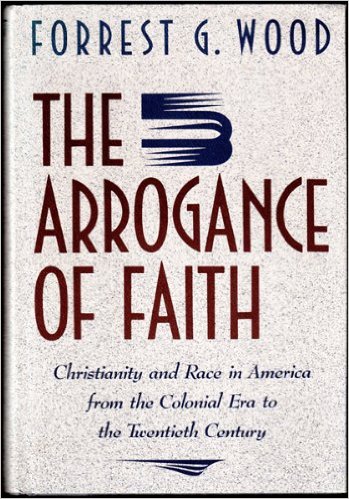
The Arrogance of Faith
BY FORREST G. WOOD (PUBLISHED1990 BY KNOPF BOOKS, NEW YORK. 517 pages)
The subject of this book is the role Christianity played in the perpetuation of slavery in the United States. The theme is especially relevant, given that so much academic ink has been spilled on contrary theses attempting to prove how Christians, inspired by their faith, were responsible for ending human bondage. Author Forrest Wood conclusively counters this traditional view by providing irrefutable facts that, in addition to refuting this common misconception, also indirectly hints at the dishonesty of trying to make Christianity out to be the hero in slavery’s eradication.
The author focuses on the writings of Christian apologists for slavery and their scriptural justifications. One of the most popular of these is found in Genesis 9: 21-27: Noah punishes his son Ham for disrespect by cursing Ham’s son Canaan into a life of slavery. Many proslavery advocates were convinced that Ham was the ancestor of the black race and that the curse put upon Canaan descended to the Blacks of Africa. Since this was the will of “God,” abolitionists’ attacks on slavery was seen as nothing less than an attack on God’s word.
Wood’s account is straightforward and hard-hitting yet quite fair. He acknowledges the individual efforts of a number of church leaders in the antislavery movement but points out that there was never a concerted effort on the part of Northern denominations to eradicate the “peculiar institution.”
Wood effectively documents just how few were the numbers of organized men of the cloth opposing slavery. One particularly telling example was seen in the work of the American Tract Society, which distributed little pamphlets on just about every conceivable “sin” but failed to come up with a single one on slavery. Nor did they, for that matter, publish anything about the rights of women, a movement just then getting underway.
One of the most profound points in the books is that Christianity’s hypocritical espousal of “love, compassion, and forgiveness” was only manifest within the context of conversion. The unconverted were consequently still subject to hatred, intolerance, discrimination, ostracism, and persecution, a trend that continues to this day in fundamentalist circles.
Demonstrating these “true Christian values,” Africans’ tribal traditions were stamped out and families broken apart in the name of spreading the “good news” to the heathen. Since Christianity was the religion of the first society to produce the weapons and war and destruction and also to use them forcibly as instruments of evangelization, one must agree with the author that this is the most corruptible of faiths. Or, more likely, the corruption was built into the system from the beginning.
Alexis de Tocqueville, in his celebrated “Democracy in America,” written in 1835, might well have been speaking of our own time when he said, “I know of no country in which, generally speaking, there is less independence of mind and true freedom of discussion than America.”
The institution of slavery is one of the ugliest blots on the historical record of humanity. That the church, which constantly depicts itself as a bastion of morality, failed to raise its collective voice in outrage against it constitutes a most unforgivable example of hypocrisy.
For those interested in reading a contrary viewpoint to the traditional views on slavery’s origins and sustenance, promulgated and sustained in universities throughout the country, and for any intellectually honest layperson seeking to find the real facts behind the “peculiar institution,” The Arrogance of Faith is a must-read.
Categories: Book Reviews
